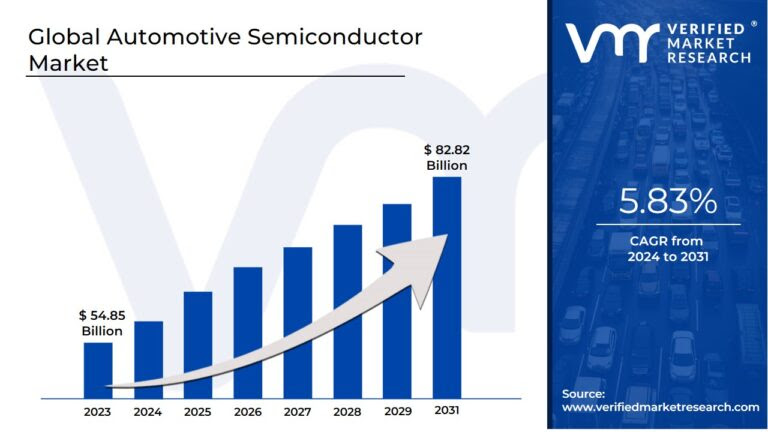According to the latest market research report released by Verified Market Research, the global automotive semiconductor market is expected to grow at a CAGR of 5.83% from 2024 to 2031. According to the report, the market will be valued at USD 54.85 billion in 2024. It is expected to reach $82.82 billion by 2031.
As a core component of modern automotive technology, automotive semiconductors play a vital role in driving the development of vehicle performance, function enhancement and intelligence. With the growing consumer demand for safety, comfort and intelligence in automobiles, the scope and importance of automotive semiconductors are also increasing.
One of the major drivers driving the growth of the automotive semiconductor market is the rapid expansion of the electric vehicle market. Electric vehicles not only need high-performance semiconductors to support their battery management systems, motor control systems, and charging infrastructure, but also semiconductor technology to enable more efficient energy use and lower carbon emissions. With the global governments focusing on environmental protection and energy conservation, the market share of electric vehicles is expected to continue to increase, thereby driving the rapid growth of the automotive semiconductor market.
The automotive semiconductor market is expanding rapidly as the demand for autonomous vehicles and ADAS (Advanced Driver Assistance Systems) continues to grow. As OEMs strive to achieve higher levels of vehicle automation, the demand for advanced semiconductors that can process large amounts of data in real-time is increasing. This trend has not only increased semiconductor sales, but has also fostered innovation, thus providing businesses with opportunities for cutting-edge technologies.
Chart: Global Automotive Semiconductor Market Size (Source: Verified Market Research)
In addition, with the continuous development of autonomous driving technology, the requirements for automotive semiconductor technology are also increasing. Autonomous driving systems need to process large amounts of sensor data, perform complex decision-making calculations, and enable real-time communication with other systems in the vehicle. The realization of these functions is inseparable from the support of high-performance automotive semiconductors. Therefore, with the popularization and application of autonomous driving technology, the automotive semiconductor market will also usher in greater development opportunities.
In addition to electric vehicles and autonomous driving technology, the automotive semiconductor market also benefits from innovation and development in other areas. For example, as connected car technology continues to evolve, cars are becoming more intelligent and connected. This requires higher data processing capabilities and lower power consumption in automotive semiconductors to meet the needs of real-time communication and remote control. At the same time, with the increasing consumer demand for in-vehicle entertainment and information services, automotive semiconductors also need to have more powerful multimedia processing capabilities and richer functional support.
In terms of regional markets, the rapid rise of emerging markets such as China and India also brings huge growth potential to the automotive semiconductor market. These countries are experiencing rapid industrialization and urbanization, and the demand for automobiles is growing rapidly. At the same time, consumers' demand for intelligent and connected vehicles in these countries is also increasing, providing a broad market space for the automotive semiconductor market.






